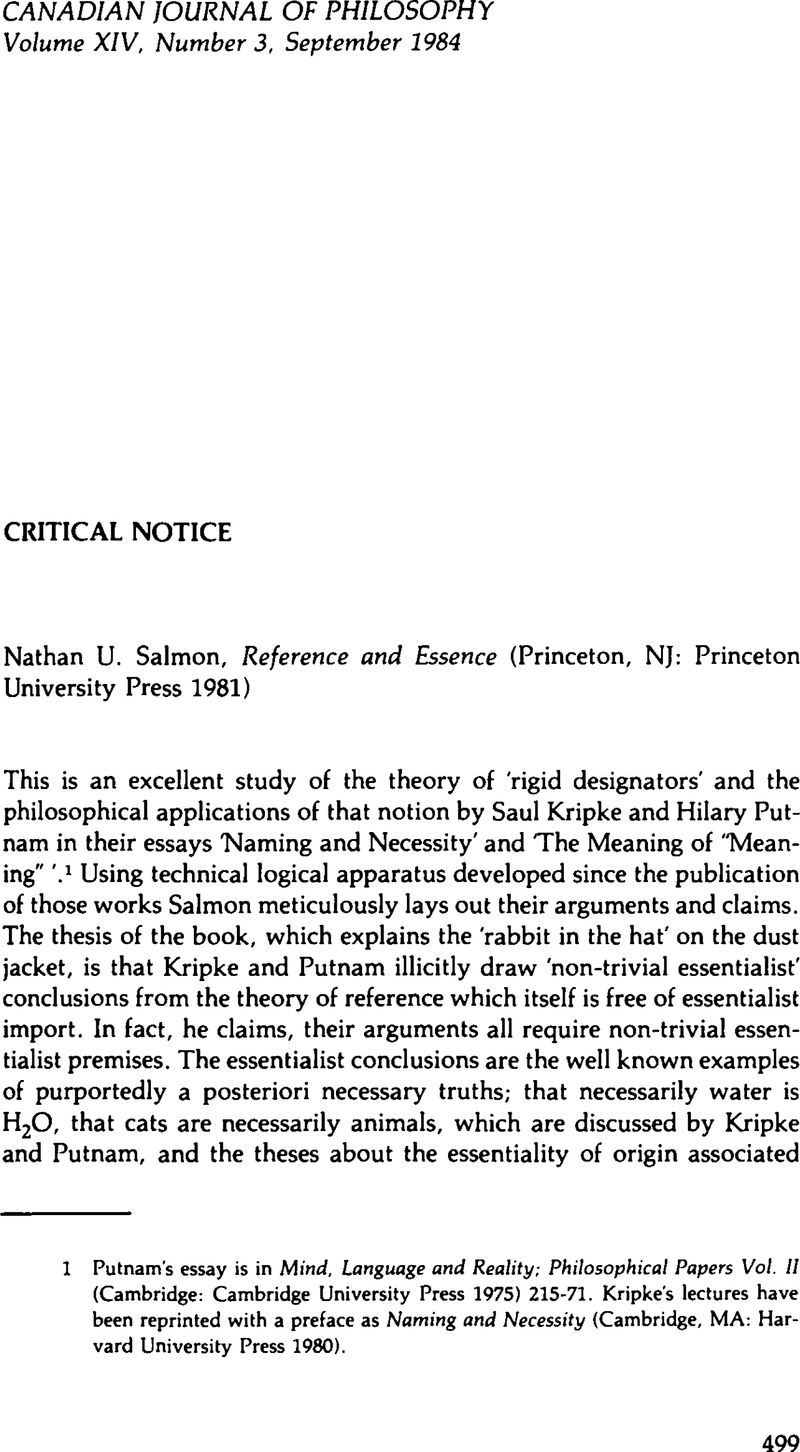Article contents
Nathan U. Salmon Reference and Essence (Princeton, NJ: Princeton University Press 1981)
Review products
Published online by Cambridge University Press: 01 January 2020
Abstract

- Type
- Critical Notice
- Information
- Copyright
- Copyright © The Authors 1984
References
1 Putnam's essay is in Mind, Language and Reality; Philosophical Papers Vol. II (Cambridge: Cambridge University Press 1975) 215-71. Kripke's, lectures have been reprinted with a preface as Naming and Necessity (Cambridge, MA: Harvard University Press 1980).Google Scholar
2 And would be correct if it weren't for problems like Theseus’ ship. Appendix I contains a convincing solution of supposed paradoxes such examples engender given principles like (V’). Yet Salmon shows that our intuitions about (V’) are correctly upset by reflecting on matter and objects through time. (V’) can't be accepted as it stands.
3 See the footnote on page 1 of Naming and Necessity and Putnam's ‘Why there Isn't a Ready Made World', Synthese 51 (1982) 157 for these disclaimers.
4 Carnap gives examples of bad metaphysics in ‘The Elimination of Metaphysics Through Logical Analysis of Language.’ The image of philosophy as a process of sorting claims is in Schlick, Moritz ‘The Turning Point in Philosophy.’ Both are in Alfred Ayer, J. ed. Logical Positivism (New York: MacMillan 1959).Google Scholar A cursory survey of Erkenntnis yields few examples from Aristotelian Essentialism.
5 Putnam, ‘It Ain't Necessarily So,’ in Mathematics, Matter and Method; Philosophical Papers Vol. I. Cambridge: Cambridge University Press 1975), 237-49
6 Quine, W.V.O.. ‘Three Grades of Modal Involvement.’ in The Ways of Paradox (New York: Random Houase 1966) 156-74.Google Scholar Quine foresaw that the only way to explain such necessary truths would be to abandon analytic truth and plunge into the ‘jungle’ of Aristotelian Essentialism.
7 Pap, Arthur Semantics and Necessary Truth (New Haven, CT: Yale University Press 1958)Google Scholar. Pap is the hero of this review.
8 See ‘ What is Mathematical Truth?’ in Mathematics. Matter and Method. 60-78 and the Introduction to Mind. Language and Reality for a discussion of this attack on analytic and a priori truth.
9 Salmon has suggested (in conversation) that one distinguish, ‘a designates x with respect to world ω’ from ‘a designates x in world ω', where I have indifferently used ‘in.’ The notion of designating with respect to a world would be used to define rigid designation. On the other hand the semantic, Twin Earth arguments show us what a name would designate in a particular world. Thus the name ‘Gödel,’ being (obstinately) rigid, designates Gödel with respect to all worlds. In designates Gödel in his world and would still designate him in a world where someone else first proved the incompleteness theorems, but it would designate someone else in a Twin Earth where some other individual is its causal source.
This distinction certainly marks the distinctive nature of the semantic arguments. Seen this way they show nothing about whether terms are rigid designators. Perhaps what I present below as two theories of designating in a world can be recast as accounts of the relation between designating ‘in’ and ‘with respect to’ a world, in Salmon's sense. I don't see his distinction as showing the discussion to be confused or as resolving it, but perhaps I have missed the force of his suggestion.
10 For another view of the import of Twin Earth lacking Salmon's close adherence to Putnam's text and his clear technical distinctions, but without semantic facts, see this author's ‘Putnam on the Meaning of Natural Kind Terms’ this journal 7 (1977) 819-28
11 Gupta, Anil confronts this in ‘Modal Logic and Truth,’ Journal of Philosophical Logic, 7 (19791 441-72.Google Scholar
12 See also Devitt, Michael Designation (New York: Columbia University Press 1981).CrossRefGoogle Scholar
13 Brody, Baruch argues that in fact names for ‘non persisting’ objects or possible world slices are prior to ordinary names. Identity and Essence (Princeton: Princeton University Press 1980). 109-11.CrossRefGoogle Scholar
14 Making the interpretation of predicates a function of worlds twice over leads to complications for the evaluation of simple sentences. Presumably ‘Fa’ could be true at v either if <Int a> (v)∈|<Int F > (v)|(v) or <Int a> (v)∈|<Int F> (W@)|(v).
These can differ if F is not a rigid property designator. There will be possible “scope” ambiguities with predicates as well as with singular terms. (I owe this formulation of the definitions of designation to Nathan Salmon.)
15 Armstrong, D.M. A Theory of Universals, Universals and Scientific Realism, Vol. II (Cambridge: Cambridge University Press 1978), 58Google Scholar
16 Armstrong, 58
17 So called because with this meagre slinghot of technical apparatus one can purportedly fell giant philosophical theories. Barwise, Jon and Perry, John ‘Semantic Innocence and Uncompromising Situations,’ in French, P. Uehling, T. and Wettstein, H. eds. Midwest Studies in Philosophy VI (Minneapolis: University of Minnesota Press 1981). 387–401.Google Scholar
18 Armstrong. chapter 14
- 1
- Cited by




